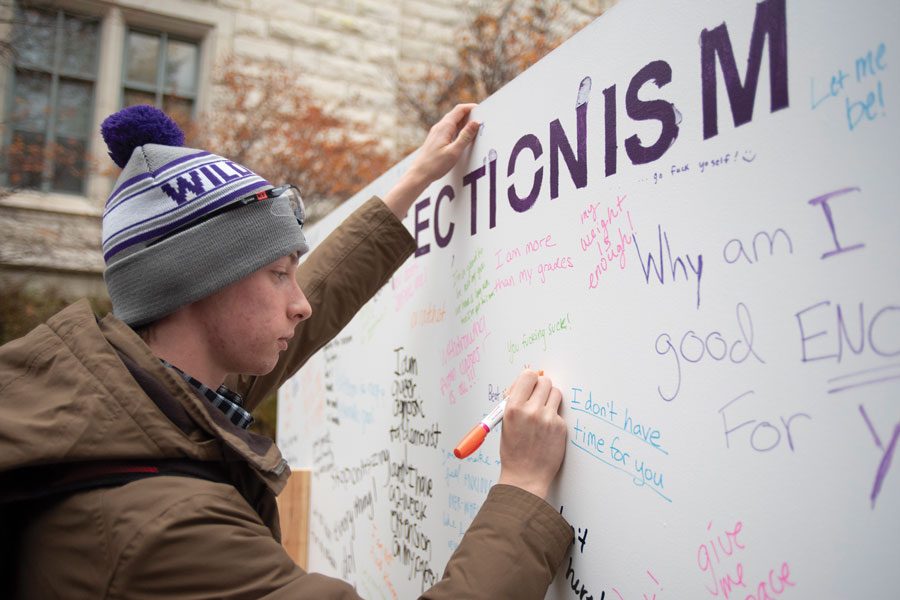Don’t pretend you’re perfect, Family Institute tells students
Colin Boyle / Daily Senior Staffer
Kevin Stoffel, Weinberg senior, writes on a board titled “Dear Perfectionism.” The Family Institute’s #PerfectlyImperfectNU campaign encourages students to “flaunt their flaws” and speak up if they need help with the pressures of school.
November 2, 2018
The Family Institute wants students to flaunt their flaws — and in return, they’ll offer hot chocolate and tips on how to cope with perfectionism and the chance to write perfectionism a postcard.
The Family Institute hosted #PerfectlyImperfectNU at The Rock Thursday to make students aware of what SESP Prof. Jessica Rohlfing Pryor calls the “silent epidemic” of modeling perfectionism at Northwestern.
“Students don’t normally talk about it or report it,” she said. “You’re a more highly achieving student and a more successful student if you can work hard without talking about how much that hurts.”
Pryor’s work at the Perfectionism Research Lab looks into the negative interpersonal effects of high levels of perfectionism, the most worrying of which is social withdrawal, she said.
Students who want to appear perfect may come off as “aloof and withdrawn,” which in turn leads to others withdrawing from them. “That’s the exact opposite of what most of us actually want,” she said.
Pryor’s research has also shown that students who demonstrate high levels of perfectionism are extremely unlikely to seek help. Other studies have revealed that students at private universities are even less likely to ask for assistance or mental health support, Pryor said, making NU students at particularly high risk.
Sarah Meister, a graduate student at The Family Institute who began working in the Perfectionism Research Lab this academic year, said she noticed the high levels of perfectionism and stress at NU when she started attending grad school.
“The types of people who get in here are competitive and incredible students,” she said. “That being said, I think there are a lot of things that come along with having to perform at such an elite level. Being able to talk about that and bringing some awareness helps.”
Meister felt pressure to be perfect as an undergraduate at the University of Missouri, where she was an athlete and student. She called her experience “mentally and emotionally exhausting” and added that having a support system like #PerfectlyImperfectNU would have served her well.
SESP sophomore Adina Barg said she thinks events like this are important, especially at Northwestern, where she said “a lot” of people are perfectionists.
“This is a very good program to have,” she said. “It’s always good to see ‘I don’t need to be good enough’ because a lot of people need to step back and realize they’re doing their best, even if their best isn’t an A.”
In addition to snacks and signs, the event featured a student panel where those who struggle with perfectionism on a day-to-day basis spoke about their experiences, an effort to normalize the conversation around this aspect of mental health.
But this is just the first step in a long process, Pryor said. She hopes to engage more of the Northwestern community and start dialogues with student groups about perfectionism as well.
“I think this is just the beginning,” Meister said. “There’s a lot more work to be done. We’re really excited to represent perfectionism as a whole because we want everyone to feel imperfectly perfect.”
Email: cameroncook2021@u.northwestern.edu
Twitter: @cam_e_cook



